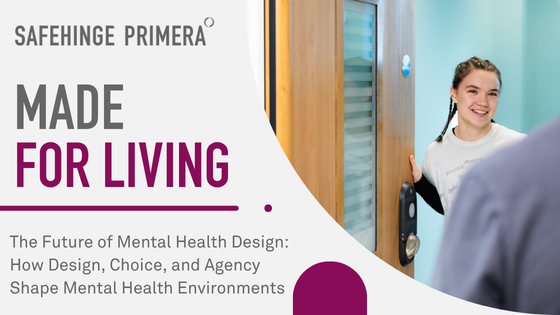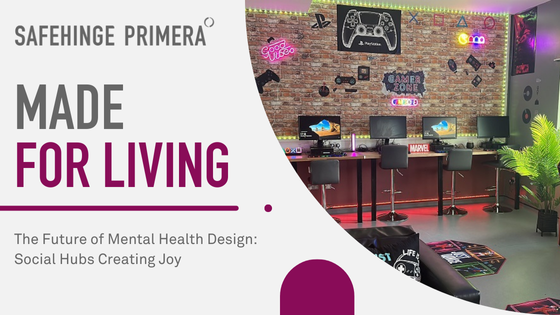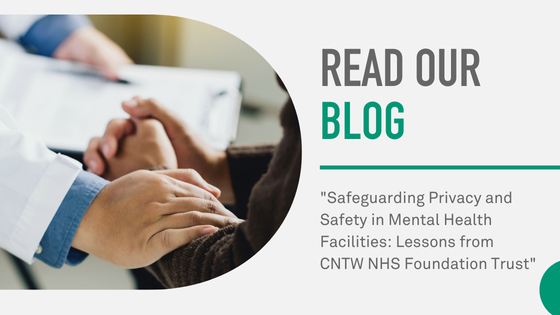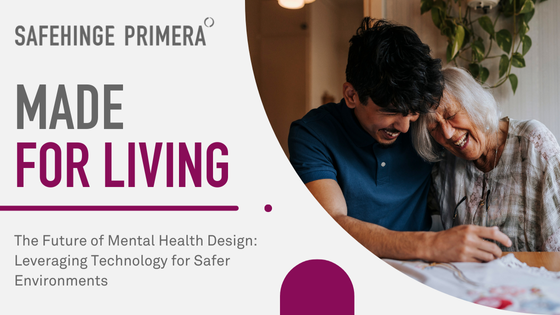-1.jpg?width=685&height=306&name=Email%20Header%201%20(1)-1.jpg)
This month, we spoke with Dan Stears, lived experience expert, mental health advocate, LGBTQ+ campaigner, and someone who’s spent more than 20 years navigating the system as a service user. Dan is now Chair of the Service User Council at Greater Manchester Mental Health NHS Foundation Trust, bridging the gap between lived experience and the systems shaping mental healthcare.
When Dan talks about co-production, he doesn’t sugarcoat: “There’s no point planning a service for a community without input from the people who’ll use it. You’re building something people won’t use.”
He shared his personal journey, and his philosophy: co-production is the foundation for safe, inclusive, and effective mental health care systems.
What Is Co-Production in Mental Health Services?
At its core, co-production is about equity in decision-making, not just consultation that presents limited choices, not tokenism, but shared power from the very first conversation. And while consultation might ask, “Which of these three options do you prefer?”, co-production starts with, “What’s missing, and what matters to you?”
Dan puts it simply: “True co-production means starting with a blank sheet, not a polished plan. It means recognising that the voices in the room — service users, staff, commissioners, designers — all carry equal weight. And it means being ready to be wrong.”
Consultation vs. Co-Production: What’s the Difference?
A recurring theme was the confusion between consultation and co-production. Dan offered an analogy to differentiate the two:
“Consultation is asking, ‘Which of these three colours do you prefer for the wall?’
Co-production is asking, ‘Do we actually need this wall?’
In other words, consultation invites feedback after decisions have been made. Co-production involves people before any decisions are made, starting with a blank sheet of paper.
The Ladder of Co-Production: A Guide for Healthcare Leaders
To help us understand the full spectrum of involvement, we turn to the Ladder of Co-Production, developed by the National Co-production Advisory Group and Think Local Act Personal. This model outlines the journey from coercion (where service users are mere spectators) through to full co-production (where they shape services side by side with professionals).
At the bottom? Coercion—where people are told what will happen.
In the middle? Consultation—where people are asked, with restricted choice..
At the top? Co-Design—where people co-create the solution from the outset.
You can download the full resource here: thinklocalactpersonal.org.uk/resources/ladder-of-co-production
As Dan reminds us, “Even well-meaning teams can fall into the trap of consultation that feels inclusive but isn’t. Co-production demands humility. It asks, ‘Are we brave enough to share the pen?’”
What Lived Experience Really Reveals
In the world of mental health hospital design, there’s no one-size-fits-all. But when we listen closely to lived experience, we uncover patterns, shared frustrations, repeated needs, and common hopes.
“You expect 20 people, 20 stories, 20 ideas. But actually, you hear echoes,” Dan says. “These echoes define the design brief.”
This is how safe, therapeutic environments take shape, from softer lighting to homely doors to more inclusive communal spaces. These aren’t “nice extras.” They’re a response to being heard.
Leadership & Lived Experience
For co-production to flourish in mental healthcare, there needs to be a shift in power dynamics. Dan acknowledges that it can be uncomfortable for senior teams to share control. But when leaders open up and share their concerns about giving up control, trust builds, and so does real change.
Dan noted:
“I’ve seen people in leadership struggle to let go of control. But when they’re honest about those fears, it opens up conversations that can lead to genuine equity.”
However, he cautioned against swinging the pendulum too far the other way. Co-production isn’t about replacing expert roles, but instead balancing them.
We must also note that co-production doesn’t mean discarding expertise. It means balancing it with insight born from experience.
As a designer and Co-Founder of Safehinge Primera Philip Ross shares:
“Co-production is not about abdication. It’s about translation. We listen with care, then use our trained design skills to create solutions that reflect what people actually need.”
This is how therapeutic environments come to life with thoughtful responses to what people have said they need to feel heard, respected, and safe.
Case Study: The Kitchen Table Revolution at GMMH
In Greater Manchester, one of the most tangible examples of co-production came from the kitchen.
Food served in inpatient units across the NHS meets nutritional standards and follows dietitian guidance, but Dan and the lived experience team were growing increasingly aware that it could do more to inspire enjoyment, variety, and a sense of comfort.
“Service Users can spend weeks, months, even years in these facilities,” Dan explains. “I wouldn’t have been happy eating from the same three-week menu for a year, and I don’t think anyone else would either. There was this belief that as long as the food was healthy, that was enough. But food is about more than that. It’s about connection, culture, and joy.
Instead of stepping back, Dan and his peers leaned in. They challenged assumptions, asked better questions, and sparked real change, transforming the mindset around meals.
A group of Service Users within Greater Manchester Mental Health NHS Foundation Trust called for more than variety. They wanted food with flavour, identity, and warmth, something you'd choose at a local pub, or that reminds you of home, not just what you’d accept in a hospital.
That question opened doors. Service Users and staff were empowered. And a whole new way of listening to lived experience began to take root.
Through collaborative feedback, the Trust increased the budget per meal, introduced more variety, and invited staff to incorporate personal touches, like Fakeaways and European Week, inspired by the head chef’s heritage.
 GMMH Sample Menu
GMMH Sample Menu
Why This Matters: Co-Designing Recovery with Lived Experience
Food might seem like a small detail. But in a mental health setting, it can be a spark of joy, a moment of agency, or a reminder of home. And when that moment is designed with the people it serves? It's the difference between coping and healing.
Dan sums it up perfectly:
“A good meal can offer hope. And hope is a gateway. Hope in food becomes hope in therapy, in relationships, and hope for tomorrow, and life.”
This transformation didn’t require a multi-million pound investment or a five-year plan. It required one thing: listening.
A group of Service Users said, “We deserve better.” And leadership chose to hear them. That’s co-production and a real positive impact. Imagine what else can be achieved through more listening.
National Recognition
As a result GMMH went on to top the PLACE assessments for NHS food quality of all Mental Health Trusts, and was shortlisted for national awards.
“I was speaking to our catering manager just last week,” Dan shares. “He’s off to London for a national awards ceremony. Imagine that a catering team in a mental health facility is being celebrated. The impact the catering staff now has on patient recovery is incredible!”
 GMMH Mental Health Nurse & Dan Stears at the National Awards
GMMH Mental Health Nurse & Dan Stears at the National Awards
A Role with Responsibility: Holding the Door Open
As Chair of the Service User Council, Dan sees his role as both representative and bridge-builder. “I’m not speaking for everyone, I’m opening the door so more people can speak.”
He also emphasises safety. Sharing lived experience, especially around trauma, self-harm harm and suicidal ideation must be done in spaces designed to hold it. “You learn how to tell your story without reliving it. Without retraumatising others. That’s part of the work too.”
Dan’s advice to others stepping into co-production roles is:
- Say yes to training, even if you’ve done it before.
- Try to always bring a solution, not just a complaint.
- Protect your own wellbeing, this work is emotional labour.
- Make space for other voices.
- And never stop listening or being curious.
Co-Production Delivers Better Outcomes - And the Research Proves It
New research from across the UK is building an irrefutable case for co-production:
-
Rapid Research with Lived Experience (2023): A Frontiers in Sociology study showed that involving lived experience researchers in COVID-19 mental health research improved outcomes and proved key to the project’s success.
-
A 2025 Lancet Psychiatry review identified over 20 mental health outcome tools co-developed with service users. Their conclusion? These tools were more relevant, more acceptable, and more effective for both patients and clinicians.
-
A 2023 Bristol-based project involving women with lived experience of trauma led to a co-produced model of primary mental health care. The result was a service that felt safer, more accessible, and better tailored to the complexities of trauma.
-
NHS England’s Patient and Carer Race Equality Framework (PCREF), introduced in 2023, requires mental health providers to co-produce anti-racist strategies with racialised communities, a structural shift placing co-production at the heart of equity.
- And in the West Midlands, the Reach Out project embedded peer support workers into secure mental health units. The result? Reduced hospitalisation rates, increased community placements, and improved patient morale.
These examples are systemic changes with measurable impact.
Final Word
Across research, policy, and frontline care, co-production is delivering results - safer spaces, stronger outcomes, and a deeper sense of dignity and hope for people navigating mental health challenges.
It’s not a shortcut. It requires time, humility, and commitment. But as the GMMH food transformation and national frameworks like PCREF demonstrate, co-production doesn’t just work, it wins awards, reduces harm, and supports healing.
And perhaps most importantly, it proves this:
When people feel heard, they start to believe they matter, their lives matter, and we all have the right to feel we matter.
Ready to Bring Co-Production to Your Project?
Whether you're designing a new facility or reviewing care pathways, co-production is how we design for good. Our team brings lived experience into every project, because great design starts with listening.
📩 Contact us to begin your co-production journey
Explore how co-production and lived experience are transforming mental health services in the UK, from reimagining meals to reshaping national frameworks like PCREF. Learn how listening first leads to lasting change.





